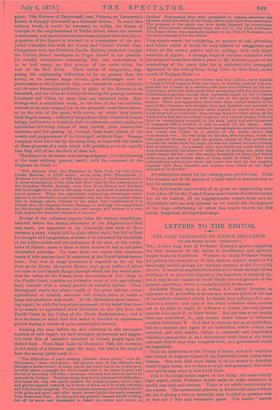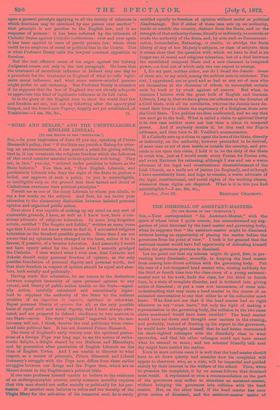LETTERS TO THE EDITOR.
THE LAST APOLOGIST OF UNDUE INFLUENCE.
[TO THR EDITOR Or THS "sPBOTATOR.1
have long been of Professor Huxley's opinion respecting the true character of the claims to intellectual and spiritual empire made by Positivists. We have to thank Professor Beesly for putting the correctness of this opinion beyond doubt by his amazingly candid apology for spiritual tyranny in the Fortnightly Review. It would be unprofitable to follow his thesis through all the windings of its perverted ingenuity (for ingenious it certainly is), but it may be not useless to recall briefly the real grounds of the general conviction, which it carefully avoids or obscures.
Professor Beesly says it is within A.'e lawful freedom to represent to B. as forcibly as he can any motives (short of the fear of immediate violence) which, he thinks, may influence B.'s con- duct as a citizen ; and that if the State considers those motives not to be such as ought to influence a citizen, the only proper remedy is to teach B. to know better. But the case is not meiely that one individual, A., uses certain moral means to influence another individual, B. It is that A. does so, not as an individual, but as a member and agent of an institution which always has asserted, and still asserts, claims to universal and unqualified obedience paramount to and inconsistent with those of the State and such that if they were complied with, civil government would be impossible.
Such ad institution is the Church of Rome, and such would be the Church of Auguste Comte if the Positivists could realise their dreams. One sees that their desire is by no means to demolish Giant Pope's house, but to have it swept and garnished, that their own spirits may enter in and dwell there. This is the broad public aspect of the thing : the more strictly legal aspect, which Professor Beesly seeks to make ridiculous, is hardly lees clear and obvious. There is no subtle technicality in the matter. The substantial question is, whether the person whose act (be it giving a vote or anything else) is called in question was or was not a free and reasonable agent. The matter " stands upon a general principle applying to all the variety of relations in which dominion may be exercised by one person over another ": that principle is not peculiar to the English law, and is no respecter of persons : it has been enforced by the tribunals of Catholic States against Catholic institutions : over and over again it has been applied in cases of purely private law, where there could be no suspicion of social or political bias in the Courts. This is what Professor Beesly calls the lawyers' constant opposition to freedom.
But the real efficient cause of his anger against the Galway Judgment comes out only in the last paragraph. He fears that the treatment of sacerdotal influence in Ireland may one day be a precedent for the treatment in England of what he calls legiti- mate moral influence, and what some narrow-minded persons might prefer to call rattening. But Professor Beesly is mistaken if he supposes that the law of England was not already adequate to appreciate this kind of legitimate influence at its full value.
It is the glory of the English race to show the world that law and freedom are one, but not by following after the apocryphal Gospel, and the brand-new Papacy, happily not yet established, of Positivism.—I am, Sir, &c.,



































 Previous page
Previous page